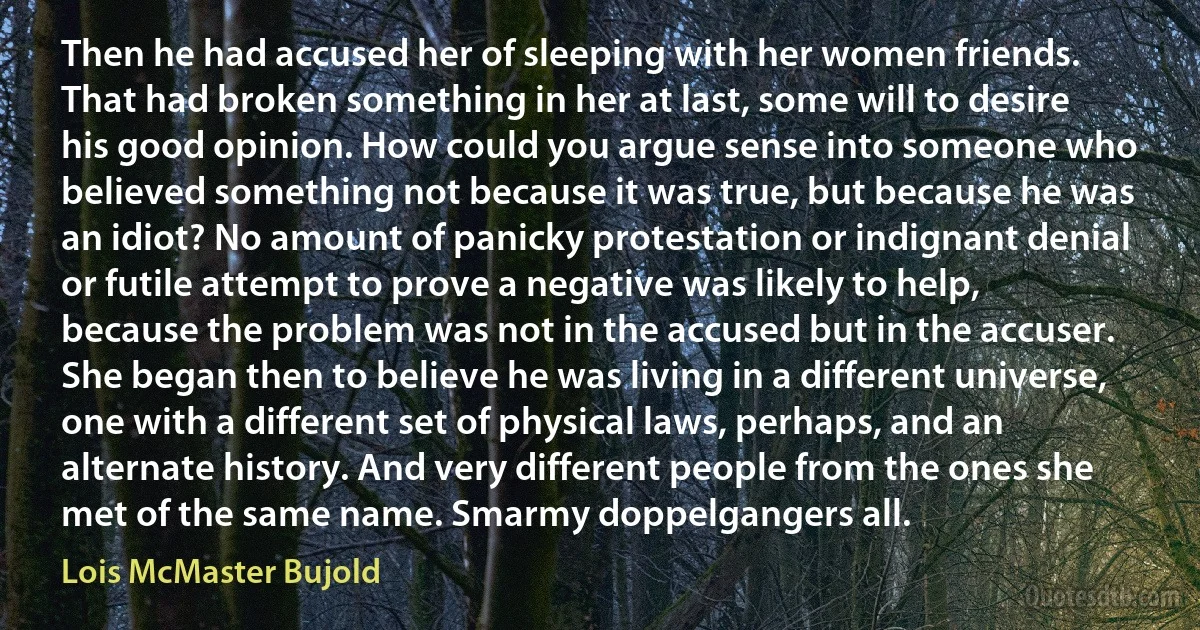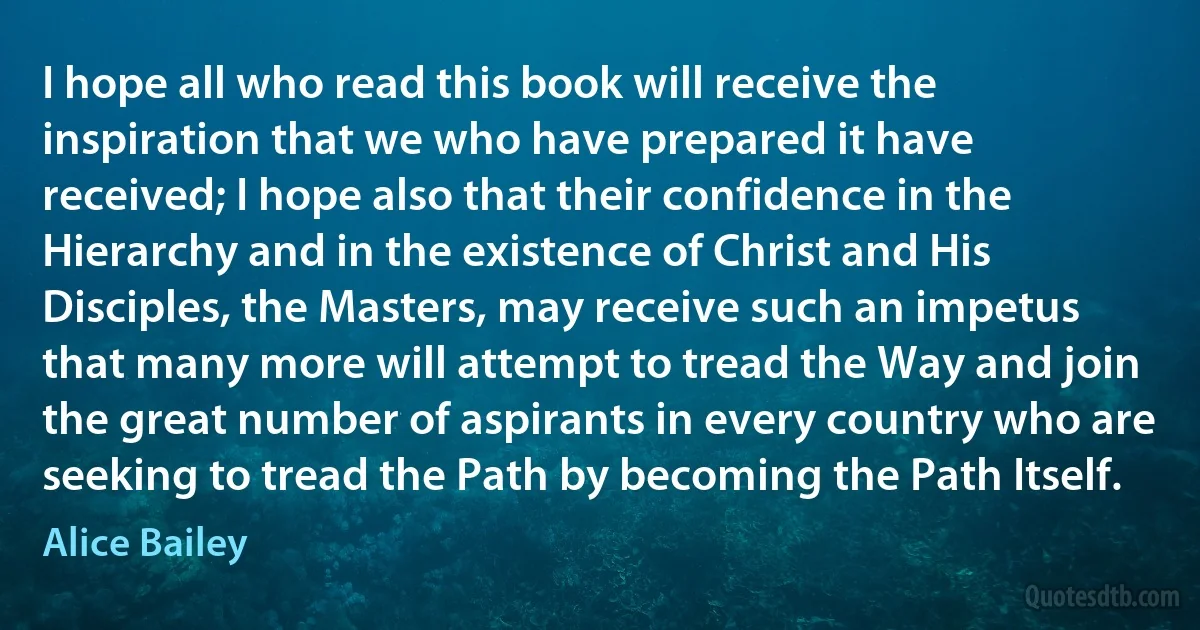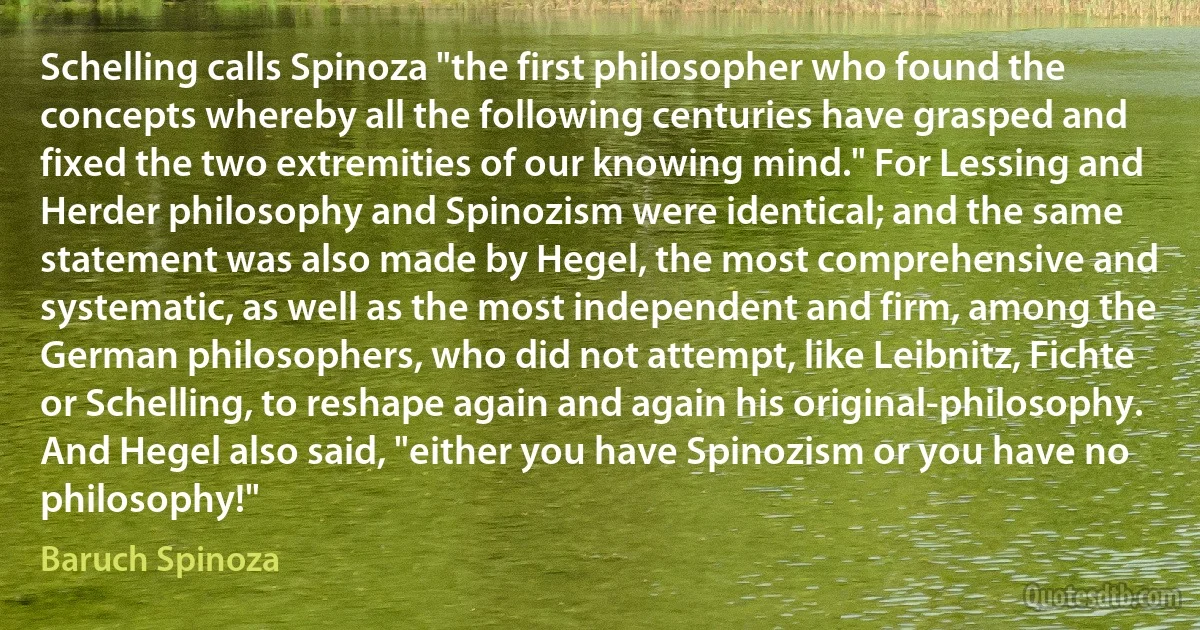Attempt Quotes - page 57
It is of infinite moment, that you should properly estimate the immense value of your national Union to your collective and individual happiness; that you should cherish a cordial, habitual, and immovable attachment to it; accustoming yourselves to think and speak of it as of the Palladium of your political safety and prosperity; watching for its preservation with jealous anxiety; discountenancing whatever may suggest even a suspicion, that it can in any event be abandoned; and indignantly frowning upon the first dawning of every attempt to alienate any portion of our country from the rest, or to enfeeble the sacred ties which now link together the various parts.

George Washington
Nowadays many intelligent young women attempt to establish good homes on mere social and psychological precepts. They turn to well-meaning advice you find in popular magazines. I don't knock it. Much of it is good. However, it never goes far enough. It will leave you stranded every time. If you truly are serious about life, nothing short of Jesus can suffice.

Anita Bryant
...public opinion justly recognized in both, above all things, the bankruptcy of the government,which, in its progressive development placed in jeopardy first the honour and now the very existence of the state.People just as little deceived themselves then as now regarding the true seat of the evil, but as little now as then did they make even an attempt to apply the remedy at the proper point. They saw well that the system was to blame; but this time also they adhered to the method of calling individuals to account.

Theodor Mommsen
During her 12 years as Secretary of Labor, Frances Perkins suffered public insults, attacks on her manner and dress, lies about her birth place and ethnicity, death threats, and finally an unsuccessful impeachment attempt. Through it all she worked 15 hour days to shorten work hours for others. She crusaded for the poor and homeless, even as her own home was broken by disease and separation.

Frances Perkins
We are, the great spiritual writers insist, most fully ourselves when we give ourselves away, and it is egotism that holds us back from that transcendent experience that has been called God, Nirvana, Brahman, or the Tao.
What I now realize, from my study of the different religious traditions, is that a disciplined attempt to go beyond the ego brings about a state of ecstasy. Indeed, it is in itself ekstasis. Theologians in all the great faiths have devised all kinds of myths to show that this type of kenosis, or self-emptying, is found in the life of God itself. They do not do this because it sounds edifying, but because this is the way that human nature seems to work. We are most creative and sense other possibilities that transcend our ordinary experience when we leave ourselves behind.

Karen Armstrong
I do not consider myself less ignorant than most people. I have been and still am a seeker, but I have ceased to question stars and books; I have begun to listen to the teachings my blood whispers to me. My story is not a pleasant one; it is neither sweet nor harmonious, as invented stories are; it has the taste of nonsense and chaos, of madness and dreams - like the lives of all men who stop deceiving themselves.
Each man's life represents the road toward himself, and attempt at such a road, the intimation of a path. No man has ever been entirely and completely himself. Yet each one strives to become that - one in an awkward, the other in a more intelligent way, each as best he can.

Hermann Hesse
Thirdly, I assume that those who set themselves seriously to benefit by the instructions in this book are prepared to carry out the simple requirements, to read what is written thoughtfully, to attempt to organise their minds and adhere to their meditation work. The organising of the mind is an all-day affair, and the application of the mind to the thing in hand throughout the daily avocations, is the best way to make study and meditation periods fruitful and bring about fitness for the vocation of disciple.

Alice Bailey
Before taking up our subject as outlined at the close of the previous volume, I would like to speak a word as to the symbolism we will employ in discussing egoic and personality control. All that is said in this connection is in an attempt to define and consider that which is really undefinable and which is so elusive and subtle that though we may call it energy or force, those words ill convey the true idea. We must, therefore, bear in mind that, as we read and consider this treatise on psychology, we are talking in symbols. This is necessarily so, for we are dealing with the expression of divinity in time and space, and until man is consciously aware of his divinity and demonstrating it, it is not possible to do more than speak in parable and metaphor with symbolic intent - to be ascertained through the medium of the mystical perception and the wisdom of the enlightened man.

Alice Bailey
It is true that two wrongs don't make a right, as we love to point out to the people we have wronged. But one wrong doesn't make a right, either. People who have been wronged will attempt to right the wrong; they would not be people if they didn't. They can rarely afford to be scrupulous about the means they will use. They will use such means as come to hand. Neither, in the main, will they distinguish one oppressor from another, nor see through to the root principle of their oppression.

James Baldwin
Professionally our methods of transmitting and reviewing the results of research are generations old and by now are totally inadequate for their purpose. If the aggregate time spent in writing scholarly works and in reading them could be evaluated, the ratio between these amounts of time might well be startling. Those who conscientiously attempt to keep abreast of current thought, even in restricted fields, by close and continuous reading might well shy away from an examination calculated to show how much of the previous month's efforts could be produced on call. Mendel's concept of the laws of genetics was lost to the world for a generation because his publication did not reach the few who were capable of grasping and extending it; and this sort of catastrophe is undoubtedly being repeated all about us, as truly significant attainments become lost in the mass of the inconsequential.

Vannevar Bush
The notion that all these fragments are separately existent is evidently an illusion, and this illusion cannot do other than lead to endless conflict and confusion. Indeed, the attempt to live according to the notion that the fragments are really separate is, in essence, what has led to the growing series of extremely urgent crises that is confronting us today. Thus, as is now well known, this way of life has brought about pollution, destruction of the balance of nature, over-population, world-wide economic and political disorder and the creation of an overall environment that is neither physically nor mentally healthy for most of the people who live in it. Individually there has developed a widespread feeling of helplessness and despair, in the face of what seems to be an overwhelming mass of disparate social forces, going beyond the control and even the comprehension of the human beings who are caught up in it.

David Bohm
The population of Majorca has always been noted for its absolute indifference to politics. In the days of the Carlistes and the Cristinos, George Sand tells us how they welcomed with equal unconcern the refugees of either side. According to the head of the Phalange, you could not have found a hundred Communists in the whole island. Where could the Party have got them from? It is a country of small market-gardening, of olives, oranges and almonds, without industry, without factories. I declare on oath that during the months preceding the civil war there was no attempt of any kind made against persons or belongings. 'There was killing in Spain,' you say. 'A hundred and thirty-five political assassinations between March and July 1936.' But in Majorca there were no crimes to avenge, so it could only have been a preventative action, the systematic extermination of suspects.

Georges Bernanos
This was the era of Mary Whitehouse, an attempt to restore old fashioned values ... there was this enormous sort of mood, particularly amongst young people to sweep away all the rather old fashioned values which seemed to exist at that time ... and he, more than anybody else, lifted the barriers. It changed the face of the country, it modernised it, in a way that we would regard as perfectly normal today.

Roy Jenkins
I note that once again there is serious talk of trying to attract tourists to this country after the war...[b]ut it is quite safe to prophesy that the attempt will be a failure. Apart from the many other difficulties, our licensing laws and the artificial price of drink are quite enough to keep foreigners away. ... But even these prices are less dismaying to foreigners than the lunatic laws which permit you to buy a glass of beer at half past ten while forbidding you to buy it at twenty-five past, and which have done their best to turn the pubs into mere boozing shops by excluding children from them.

George Orwell
The strength of the House of Commons is dissipated, its time consumed, and its dignity and reputation are threatened by the attempt to manage in one Assembly the purely local interests of different parts of the United Kingdom. Without some large measure of Devolution in the United Kingdom the House of Commons cannot attend to Imperial affairs and matters which concern the country as a whole.

Edward Grey, 1st Viscount Grey of Fallodon
I shall not attempt to speculate as to what Spinoza might have been if he had lived in our time. For me, in any case, one thing is not open to doubt: Spinoza would never have been an agent of the League of Nations. The second point that I wish to emphasize is that we do not agree to yield Spinoza to our enemies in any case. There is no reason at all for this. Spinoza was a great materialistic thinker, and in this respect he should be considered a predecessor of dialectical materialism. The contemporary proletariat is Spinoza's only genuine heir.

Baruch Spinoza
He received the Wafer from her hand. She replaced the lid of the ciborium and set the vessel in a more protected spot under a jutting rock. She used no conventional gestures, but the reverence with which she had handled it convinced him of one thing: she sensed the Presence under the veils. She who could not yet use words nor understand them, had done what she had as if by direct instruction, in response to his attempt at conditional baptism. He tried to refocus his eyes to get another look at the face of this being, who by gestures alone had said to him: I do not need your first Sacrament, Man, but I am worthy to convey to you this Sacrament of Life. Now he knew what she was, and he sobbed faintly when he could not again force his eyes to focus on those cool, green, and untroubled eyes of one born free.

Walter M. Miller, Jr.
The only successful attempt to free human reason from the authority of religion was that of Spinoza (1632–1677). In his Theologico-Political Treatise (1670) he denied the claims for divine authority based on the text of Scripture and religious tradition. [...] Spinoza was the first secular Jew, and as such, the first secular man. Indeed, he served as the role model for all secular Jews, instituting the precise features that characterized future Jewish secularists.

Baruch Spinoza
How then could such a figure, seemingly the least ‘historical' of philosophers, provide thinkers concerned with transformation, novelty, the event, with the wherewithal to advance radical projects of thought? Why is Spinoza repeatedly be invoked in the most urgent of political and ideological polemics? How could a philosophy turned toward the eternity of being (an ontology) link up with the attempt to understand the collective construction of a common political space and the sometimes catastrophic incursion of worldly events?

Baruch Spinoza



